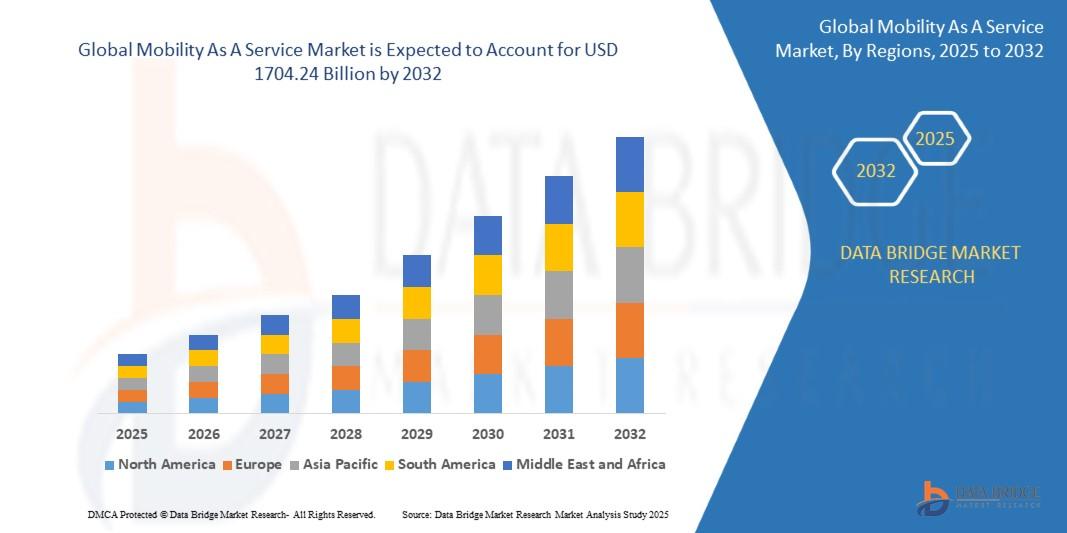Mobility as A Service Market Size, Status and Outlook 2032

"Executive Summary Mobility as A Service Market Research: Share and Size Intelligence
CAGR Value
- The global mobility as a service market was valued at USD 167.41 billion in 2024 and is expected to reach USD 1704.24 billion by 2032
- During the forecast period of 2025 to 2032 the market is likely to grow at a CAGR of33.65%, primarily driven by rising demand for convenient, cost-effective, and flexible transportation options
Market research studies stated in this Mobility as A Service Marketreport are very thoughtful for the businesses which assist them with the better decision making and develop better strategies about production, marketing, sales and promotion. This Mobility as A Service Market report brings together comprehensive industry analysis with exact estimates and forecasts that offers complete research solutions with maximum industry clarity. The report includes CAGR value fluctuations during the forecast period of 2018-2025 for the market. And to serve the clients best in the industry, a team of experts, skilled analysts, dynamic forecasters and knowledgeable researchers work meticulously while forming this report.
This Mobility as A Service Market report is an ultimate source of information about the industry, important facts and figures, expert opinions, and the latest developments across the globe. The report studies various inhibitors as well as motivators of the market in both quantitative and qualitative manner so that users can have perfect information. The base year for calculation in the Mobility as A Service Market report is considered as 2017 while the historic year is 2016 which will tell you how the Mobility as A Service Market is going to perform in the forecast years. The Mobility as A Service Market report introduces the basics of industry such as market definitions, classifications, applications and industry chain overview, after which it covers industry policies and plans, product specifications, manufacturing processes, cost structures and so on.
Find out what’s next for the Mobility as A Service Market with exclusive insights and opportunities. Download full report:
https://www.databridgemarketresearch.com/reports/global-mobility-as-a-service-market
Mobility as A Service Market Dynamics
**Segments**
- Based on service type, the global Mobility as a Service (MaaS) market can be segmented into **Ride Hailing, Ride Sharing, Car Sharing, Bike Sharing, Scooter Sharing, and Public Transport**. Each of these segments plays a crucial role in the overall landscape of MaaS, offering unique solutions to cater to the diverse needs of consumers. Ride hailing services, such as Uber and Lyft, have gained widespread popularity for their convenience and ease of use, while car sharing and bike sharing services provide sustainable transportation options for urban dwellers. Scooter sharing is also emerging as a popular mode of transportation in many cities around the world, particularly for short distance trips.
- On the basis of vehicle type, the market can be further divided into **Cars, Bikes, and Scooters**. The increasing focus on reducing carbon emissions and promoting eco-friendly transportation solutions has led to a rise in the adoption of electric vehicles in MaaS offerings. Electric bikes and scooters are gaining traction as convenient and environmentally friendly modes of transport for short commutes in urban areas.
- Geographically, the market can be segmented into **North America, Europe, Asia Pacific, Latin America, and Middle East & Africa**. North America and Europe are leading regions in the MaaS market, driven by the presence of key industry players, favorable government regulations, and high adoption rates of smart mobility solutions. Asia Pacific is also witnessing significant growth in the market, attributed to rapid urbanization, increasing disposable incomes, and a shifting preference towards on-demand transportation services.
**Market Players**
- Key players in the global Mobility as a Service market include **Uber Technologies Inc., Lyft Inc., BlaBlaCar, Grab Holding Inc., ANI Technologies Pvt. Ltd. (Ola), Gett, Careem, Taxify, Mobike, Lime, Bird Rides Inc., and Zipcar**. These companies are at the forefront of innovation in the MaaS sector, offering a wide range of services to meet the evolving needs of consumers. Collaborations and partnerships among these market players are common, as they seek to enhance their service offerings and expand their market presence.
For more insights, visit The global Mobility as a Service (MaaS) market is experiencing a rapid evolution driven by changing consumer preferences, technological advancements, and government initiatives towards sustainable transportation solutions. One of the key trends shaping the market is the integration of multiple transportation modes into seamless, end-to-end mobility solutions. This trend is fueled by the increasing need for convenient, efficient, and cost-effective transportation options in urban areas facing issues such as traffic congestion and pollution. MaaS platforms are leveraging advanced technologies such as AI, IoT, and data analytics to optimize route planning, payment systems, and user experiences, further enhancing the attractiveness of these services to consumers.
Another significant trend in the MaaS market is the emphasis on sustainability and eco-friendliness in transportation solutions. With growing concerns about carbon emissions and environmental impact, there is a rising demand for electric vehicles (EVs) in MaaS offerings. Electric bikes, scooters, and cars are gaining popularity as they offer a cleaner and greener alternative to traditional fossil fuel-powered vehicles. Market players are investing in expanding their fleets of EVs and developing charging infrastructure to support the widespread adoption of electric mobility solutions.
Moreover, regulatory support and government initiatives are playing a crucial role in shaping the MaaS landscape. Many countries are introducing policies and incentives to promote the use of shared mobility services, reduce private car ownership, and address urban mobility challenges. Governments are encouraging public-private partnerships to develop integrated transportation systems that offer seamless connectivity between different modes of transport. Such collaborative efforts are driving innovation in the MaaS market and fostering sustainable mobility solutions that benefit both consumers and the environment.
In addition, the competitive landscape of the MaaS market is characterized by intense competition among key players who are continuously striving to differentiate their offerings and capture a larger market share. Collaborations, mergers, and acquisitions are common strategies adopted by market players to enhance their service portfolios, expand their geographical presence, and gain a competitive edge. Furthermore, investments in research and development are essential to drive innovation and introduce new features that enhance user experience and satisfaction.
Overall, the global Mobility as a Service market is poised for significant growth and disruption in the coming years as technological advancements, changing consumer preferences, and regulatory initiatives continue to shape the future of urban mobility. Market players that can adapt to these evolving trends, leverage advanced technologies, and offer sustainable, integrated transportation solutions are likely to emerge as leaders in this dynamic and competitive market.The global Mobility as a Service (MaaS) market is witnessing a rapid transformation driven by several key trends and factors that are reshaping the urban transportation landscape. One notable trend is the increasing integration of various transportation modes into seamless MaaS platforms, offering consumers convenient and cost-effective mobility solutions. With the rise of urbanization and congestion issues, there is a growing demand for efficient and sustainable transportation options, leading to the popularity of MaaS services. The integration of advanced technologies such as artificial intelligence (AI), Internet of Things (IoT), and data analytics is optimizing route planning, payment systems, and overall user experiences, enhancing the attractiveness of MaaS offerings.
Sustainability and eco-friendliness are becoming essential considerations in the MaaS market as consumers, businesses, and governments prioritize reducing carbon emissions and promoting cleaner transportation solutions. The shift towards electric vehicles (EVs) in MaaS offerings, including electric bikes, scooters, and cars, is gaining momentum as they offer environmentally friendly alternatives to traditional fossil fuel-powered vehicles. Market players are investing in expanding their fleets of EVs and developing charging infrastructure to support the adoption of electric mobility solutions, aligning with the growing emphasis on sustainability in the transportation sector.
Government regulations and initiatives are also shaping the MaaS landscape, with many countries introducing policies and incentives to encourage shared mobility services, reduce private car ownership, and address urban mobility challenges. Public-private partnerships are being fostered to develop integrated transportation systems that provide seamless connectivity between different modes of transport, driving innovation and sustainable mobility solutions in the market. This regulatory support is crucial in fostering collaboration among stakeholders and promoting the adoption of MaaS services that benefit both consumers and the environment.
In a highly competitive market environment, key players in the MaaS sector are continuously seeking ways to differentiate their offerings, expand their market presence, and enhance their service portfolios. Collaborations, mergers, and acquisitions are common strategies employed by market players to stay ahead of the competition and meet the evolving needs of consumers. Investments in research and development are also essential to drive innovation and introduce new features that improve user experience and satisfaction, ensuring competitiveness in the dynamic MaaS market landscape.
Overall, the global Mobility as a Service market is poised for substantial growth and disruption in the years to come, driven by technological advancements, shifting consumer preferences, and regulatory initiatives towards sustainable urban mobility solutions. Market players that can adapt to these evolving trends, leverage advanced technologies, and deliver integrated, environmentally friendly transportation options are well-positioned to lead the industry and capitalize on the opportunities presented by the dynamic market landscape.
Track the company’s evolving market share
https://www.databridgemarketresearch.com/reports/global-mobility-as-a-service-market/companies
Master List of Market Research Questions – Mobility as A Service Market Focus
- What is the scope of the global Mobility as A Service Market?
- What is the anticipated pace of growth for the Mobility as A Service Market sector?
- What Mobility as A Service Market segments are most profitable?
- Who are the powerhouses in the global Mobility as A Service Market?
- What are the top-performing countries in the dataset for the Mobility as A Service Market?
- What firms are ranked highest in revenue in Mobility as A Service Market?
Browse More Reports:
Global Production Chemical Market
Global Proopiomelanocortin Deficiency Treatment Market
Global Property Management Market
Global Pulmonary Alveolar Proteinosis Drug Market
Global Pulse Flours Market
Global Puncheon Barrel Market
Global Pyrimethamine Market
Global Radiosurgery Systems (Neurology Devices) Market
Global Rapid Influenza Diagnostics Market
Global Rare Hemophilia Factors Market
Global Ready to Eat Soup Market
Global Real Time Health Monitoring Devices Market
Global Recruitment Process Outsourcing Market
Global Refurbished Medical Imaging Equipment Market
Global Reiter’s Syndrome Market
North America Ocular Pain Market
About Data Bridge Market Research:
An absolute way to forecast what the future holds is to comprehend the trend today!
Data Bridge Market Research set forth itself as an unconventional and neoteric market research and consulting firm with an unparalleled level of resilience and integrated approaches. We are determined to unearth the best market opportunities and foster efficient information for your business to thrive in the market. Data Bridge endeavors to provide appropriate solutions to the complex business challenges and initiates an effortless decision-making process. Data Bridge is an aftermath of sheer wisdom and experience which was formulated and framed in the year 2015 in Pune.
Contact Us:
Data Bridge Market Research
US: +1 614 591 3140
UK: +44 845 154 9652
APAC : +653 1251 975
Email:- corporatesales@databridgemarketresearch.com
"







